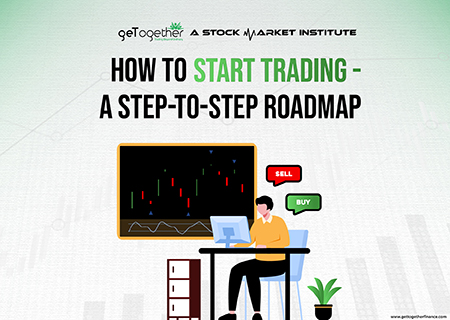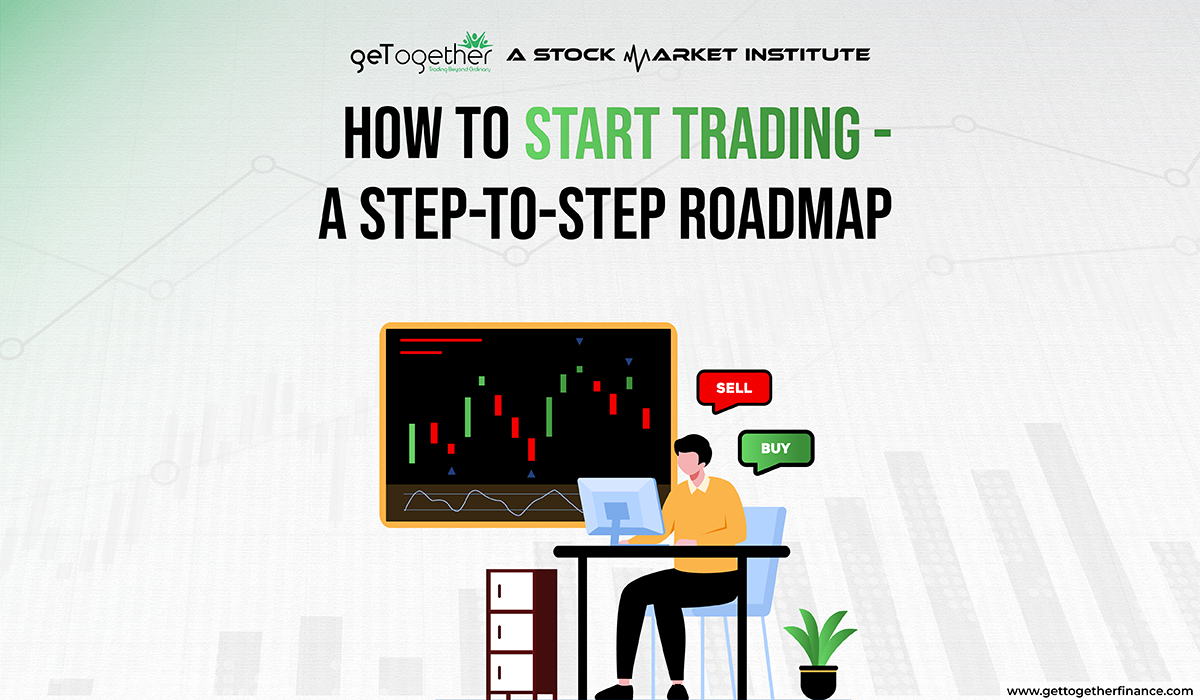How To Start Trading – A Step-to-Step Roadmap


Overview
We’ve all heard those rumors where traders are making big bucks through online trading, right? Well! The whole concept sounds extremely exciting, but if you don’t know how to start trading, it can be a bit overwhelming. Like other amateur traders, we have also begun our journey, not knowing anything at all about the stock market. But don’t worry; we are here to rescue you from the trouble! Let’s break down the information of online trading in India and how to get started.
What is Trading?
Let’s begin with the basics. Trading is like playing a game, but instead using dice or cards, you trade securities and other financial assets. It is different from investing, which mostly focuses on buy-and-hold strategy. The benefit of trading is to both parties – depending on the trader’s strategy and stock market knowledge.
Fun Fact: The first long-distance trade was practiced 5,000 years ago between Mesopotamia and the Indus Valley.
In India, there are two types of trading: Primary and Secondary. Here let’s roll the basic grounds of these:
Primary Trading:
Imagine buying a video game directly from a game developer – that’s primary trading. Primary market happens when companies issue new shares to raise capital. It offers traders the right to buy an offering from the bank who did the initial underwriting of a specific stock. Best example of a primary market is an IPO.
Secondary Trading:
Now imagine buying the same video games from any shop at the marketplace. Here, traders buy or sell securities with the investors in the secondary market, often known as “stock market”, such as NSE, BSE, NYSE, etc. This is the part we will be discussing further in this blog.
Interesting Fact: $32 trillion was the recorded global trade value in 2022 according to the United Nations Conference on Trade and Development.
How to Start Online Trading in India

After the digitalization of India, trading has become convenient and getting popular among youth everyday. Now that you want to dive deep into the world of online trading, let’s begin with the baby step – how to start online trading:
Selecting an Online Broker
First and foremost, you will need a trading platform or a brokerage account to get started. Think of it as your door to the stock market journey. In India, there are several options available for a broker, such as Sharekhan, Dhan, Zerodha, Upstox and more. Each option comes with brokerage fees and features. Zerodha and Dhan is one of the popular choices among traders for its user-friendly interface and minimal brokerage fees.
Open Demat Account & Complete KYC
Just like a retailer helps you with finding stuff at a store, your online broker will help you set-up your Demat (Dematerialized) and trading account. Further, you will need to complete your KYC (Know Your Customer) for identity verification. It requires personal documents, including PAN card, Aadhar card, and bank details.
Fund Your Account
Once you complete the account set-up, you’ll need to add money to your trading wallet. You can transfer money from your bank account to your trading account.
Research and Learn
If you go to the market to buy a car, you explore all the options and features available before making a purchase, right? Just like that – research and learn about your favorite stock before you start trading. Understand how it works, the different types of orders, and the risks involved. Remember – in this battlefield – knowledge is your best weapon. Learn from the best courses and equip yourself with basic knowledge.
Or you can access Trading in the Zone – Elementary course for free on YouTube and get started with your trading journey.
Now you have successfully learnt how to open your trading account with added tips (for our friend). Market is dynamic and trading comes with certain risks. It’s important to equip yourself with necessary market knowledge before making a major investment.
Benefits of Online Trading
Why do people get into online trading? For the same reason, everyone does – money. But what’s more than money that online trading has to offer. Well, here are some of the perks:
- Convenience: You can trade from the comfort of your home or anywhere with an internet connection.
- Access to Information: You get access to a wealth of information and research tools to help you make informed decisions.
- Diversification: You can invest in a variety of assets, spreading your risk.
- Cost-Effective: Online trading platforms often have lower fees compared to traditional brokers.
How to Open A Demat Account

Consider it like your digital wallet that holds stocks and other securities. If you want to know how to open a Demat account – here follow these steps:
Choose a Depository Participant (DP)
A DP is an institution that holds your Demat account. It often includes brokerage firms and banks such as Dhan, Zerodha, Sharekhan, HDFC Securities etc.
Fill Out an Account Opening Form
Move next in the process by completing your details, including your PAN card, bank details, etc.
Submit KYC Documents
Just like the trading account process, you’ll need to submit essential KYC documents to confirm your identity for security purposes.
Lock the Agreement
Read thoroughly all the terms and conditions and lock your process of Demat account opening via signing the agreement.
Get Your Demat Account Number
Once the application is successfully processed, you will receive a Demat account number.
Well! Now you’re all ready to start your trading journey!
Writer’s Tip: Knowing all the cuts and edges of the stock market will help sharpen your game and reduce the market risk that everyone talks about.
How to Choose Stocks For Trading

Now, let’s get to the fun part – selecting stocks to trade. Here’s a simple strategy for you:
Research: Study the companies you believe in, including their financial health, earnings reports, and industry trends. You can also pick blue chip companies as a beginner for a safe play.
Diversify: Well! Don’t put all your eggs in one basket. Spread your risk and invest in multiple but not too many stocks. You can go with different sectors or industries too.
Set Financial Goals: Whether you want to trade for long-term or short-term gains. As per our expert Instructor, Mr Sooraj Singh Gurjar suggests – believe in your own research and do your own homework. Never just rely on news, rumors or tips from friends.
Writer’s Takeaway
Stock market is like a vast ocean – a venture that leads to financial freedom. But to get through this – you need to equip yourself with a compass, right map, and basic knowledge of the stock market. Remember – practice makes a man perfect but if you’re women – know that there are no exceptions for you here either (wink-wink). Learn, practice, and observe the market fluctuations – until there is no one to predict the market like you do.
FAQs
Is it safe to trade online?
Absolutely. If you select a reliable broker and follow secure practices, with many advanced measures of authentications and securities, trading is made safe. All brokerage companies use CDSL generated T-PIN – a one time user-generated pin to verify all orders on the demand accounts to keep all trades secure.
How can I trade online?
As the process mentioned above in the blog, trading online requires below mentioned stages:
Identify your stockbroker: Select a brokerage service provider – registered with any of these two depository participants – CDSL or NSDL.
Open A Demat and Trading Account: Open a Demat or trading account following mentioned steps in the above blog.
Add Money & Start Trading: Link bank account with trading account and start your trading venture.
Key Takeaway: To know basic knowledge of trading and stock market is crucial to ace your trading skill. You can also access Trading in the Zone – Elementary to learn about trading basics for free.
Is stock investing safe for beginners?
Share trading is simple and definitely safe for beginners if done on a reliable platform. Although it is suggested to know the recipe thoroughly before starting your trading journey. Since it involves the money, it is crucial to know all the risks and rewards before kick starting your journey, while investing with low money.
Is stock trading for beginners?
Yes! Anyone can do stock trading from anywhere and there is no specific qualification criteria one needs to start trading. However, one should know how to read financial reports, charts, and other aspects of stock trading – known as fundamental and technical analysis. This helps improve your research on the stock and increase the stock accuracy. A good trader always knows their game before they jump in with the big guns. Market is dynamic and involves risks – it is crucial to know your risks prior to starting a trading journey.
Can I invest a small amount of money in stocks?
Yes! You can start your trading journey with a minimum amount of RS 500 to the amount of your risk tolerance. But remember to invest the amount as per your financial capacity and know the fundamentals of trading to get the best out of your investment.
Do I need the experience to start trading stocks in India?
No, you don’t need any prior experience to start trading in India. However, it is equally crucial to know the risk and good understanding of the market before investing. Compare the brokerage fees and access online educational courses to expand your knowledge and create effective trading strategies.
How do I place an order?
In order to place an order, you need to log in to your trading account. Now select the stock or security you want to buy or sell, choose the order type (market, limit, stop-loss, etc.). Lastly set the desired quantity and price, and confirm the order. Here, you have successfully placed an order.
What are pledged shares?
Pledged shares are shares of a company’s stock that a borrower provides as collateral to secure a loan or credit. The lender holds these shares until the borrower repays the debt. In case the shareholder fails to repay the loan, the lender can sell the shares to recover the outstanding debt.
What is MTF Trading?
Margin trading funding is like borrowing money from a friend to invest in the stock market. It lets you control more assets than you actually own, potentially increasing gains but also risks. You’ll need to pay back the borrowed amount, and losses can be larger too. If the value of your investment drops, the lender asks the shareholder to settle the amount within T-5 days to keep your shares. If a shareholder fails to update money, the lender sells the shares to adjust the debt.
How to start trading Forex with no money?
Trading Forex with no money is challenging, but you can begin by using demo accounts provided by brokers. This allows you to practice trading strategies and gain experience without risking real funds.
Are you ready to launch your trading career with confidence and precision? If yes, click here to discover the perfect course to help you become a pro trader.



 Facebook
Facebook  Instagram
Instagram  Youtube
Youtube 
